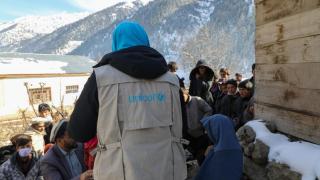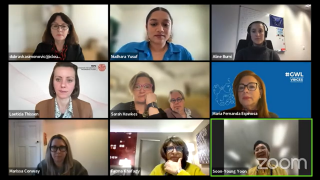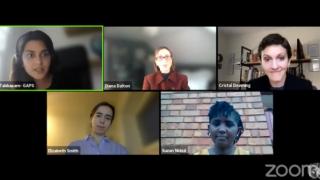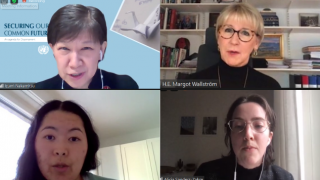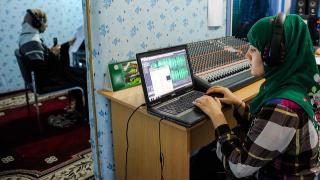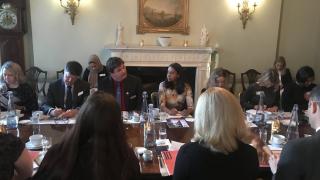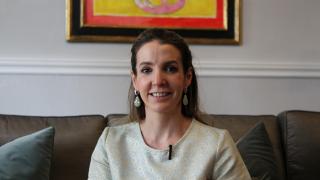
Tessy Antony de Nassau has supported UNA-UK’s work as a patron since 2017. As a former officer in the Luxembourg army and a former UN Peacekeeper serving with the mission in Kosovo in 2004, she has supported our advocacy work around UN Peacekeeping and related issues.
Ahead of International Women’s Day, Tessy sat down with UNA-UK’s Communications Coordinator, Rianna Nayee, for a discussion about the UN, her experience as a young woman UN Peacekeeper, and more.
Why did you decide to get involved with the United Nations Association – UK?
Getting involved with UNA-UK made sense, because UNA-UK is the only charity devoted to building support for the UN in the UK. I thought it was really important to support this charity specifically when it comes to peacekeeping advocacy and explore vital issues around the strengths and weaknesses of UN Peacekeeping. As a young woman deployed to Kosovo as a UN Peacekeeper, I wanted to contribute my experience and perspectives to this debate. It's always good to have someone talking about the issue who was on the ground.
We’re meeting ahead of International Women's Day, which this year focuses on gender inequality in the context of climate change. What would you like to see leaders do to empower women climate activists?
It’s crucial for our organisations, our elected leaders, and businesses, to connect with the field work around this issue. There’s a big gap between policies that are being written in ideal scenarios, and what reality actually looks like. We need more people on the ground to look at the practical needs. Where are funds needed? And how can they be allocated properly to benefit the people in need, specifically young women? With climate change it is often young women and children who are the ones that are the most disadvantaged.
Tell us about your work as a global advocate for young women and adolescent girls at UNAids. What have you learned during your time?
I’ve been involved with UNAids for years. I became a global advocate for young women and adolescent girls around my 30th birthday, so that makes it 6 years now. In that time I had the great pleasure of joining the international AIDS conference in South Africa. What I’ve learned is that women in all their diversities need to be protected and respected. This means that, for example in relation to sex workers, the women involved are in control and they decide what they want to do with their bodies. We should not discriminate, but give them the support they need. Giving them access to testing, and not just shaming them, or putting them on the side. We must respect women in all their diversity and to put in place the resources we need.
Now with the global pandemic, funds have been mostly allocated to the pandemic, which is understandable. But we also need to allocate funds to research, including on HIV/AIDS, because the pandemic of HIV/AIDS is also not going away. It’s about putting resources where they are needed at all times.
You spent five years in the Luxembourg military, and you were deployed in Kosovo as a peacekeeper and the only woman of your draft. What was that experience like? How important is it to include women in peace processes?
Women make up 50% of our societies, so whatever happens, we need to be included at all times. That includes UN Peacekeeping programmes and military programmes. When I was deployed to Kosovo, there were not many women. What I have seen is that the last thing local women in a warzone want to see is a man - because they often have been abused, physically, mentally, (encountering) all kinds of negative side effects of war. For them it’s in part just about having another woman there, talking to them, being there for them, even if it’s for a body search. Just to have someone that they can trust again.
Personally I learned so much being part of UN Peacekeeping. I was the only woman of my draft, and yes it was hard at times, because it is a male dominated field. But that doesn’t have to make my contribution any less valuable. It is our society, not just theirs. We need to make this a better society for all, and as such we need to work together and use each others’ skills to make that happen.
Can you tell us about the importance of transparency and accountability in peacekeeping?
We need accountability and transparency in all that we do - specifically the UN Peacekeeping programme because UN Peacekeepers have been found guilty of committing sexual abuses which also undermines the credibility of peacekeeping more generally. More also needs to be done to support victims and uphold their rights. We must ensure perpetrators are brought to justice, and that prevention and response to sexual exploitation and abuse is victim-centred.
There have been bad things happening in the programme. There are also good things that have happened - you need to acknowledge the bad in order to become even better. If you just hide it, or try to make it go away, it will come around anyway - if not today then maybe in a few years. And that will just undermine the good work that has been done by all of these other people. We are only as strong as the weakest link, and you cannot make something better without acknowledging that.
Throughout the years you’ve highlighted the importance of achieving the Sustainable Development Goals and integrated them into your work - what can we all do to help get the SDGs back on track?
The SDGs are very ambitious. But you need to start somewhere - by starting the conversation, by asking where can I do my part? You’re never too young to include the SDGs in your life. The SDGs are all around us, so educate yourselves and your children. You start by looking around you.
How we can implement them more in business, is to look at what your business is about, and what SDGs you can work with. Of course, don’t make the mistake of implementing 6 or 7 SDGs. You need to properly allocate your resources to address each problem, if you spread them too thin you may as well not address them at all. See which are the most relevant to your business and invest in just that one. Become a leader in one SDG and that will bring you so much further.
What can the international community do for civilians in Ukraine?
As a mother of 4, a former peacekeeper and army veteran to see that we have war so close to our borders in the 21st century with a threat of nuclear devastation looming in the background scares me. It should concern all of us, especially our elected leaders and representatives who in the past were too naive to judge the opponent correctly.
76 years on, what do you think is the value of the UN?
I think the UN is incredible, because there is no other institution in the world which combines so many countries under one mandate. Yes, it has its flaws and weaknesses, it has difficulties adjusting to the times because it is a big institution. Where there's a big institution there’s a lot of administration and that takes time. I do understand that. But the value of it is: look how many countries are involved in it, how many businesses, individuals, powerful leaders. The UN is one of a kind - and that is what we need to remind ourselves of when we look at the weaknesses as well. Work together to keep this body moving forward, to grow and become relevant again.
Photo: Tessy Antony de Nassau. Credit: UNA-UK

